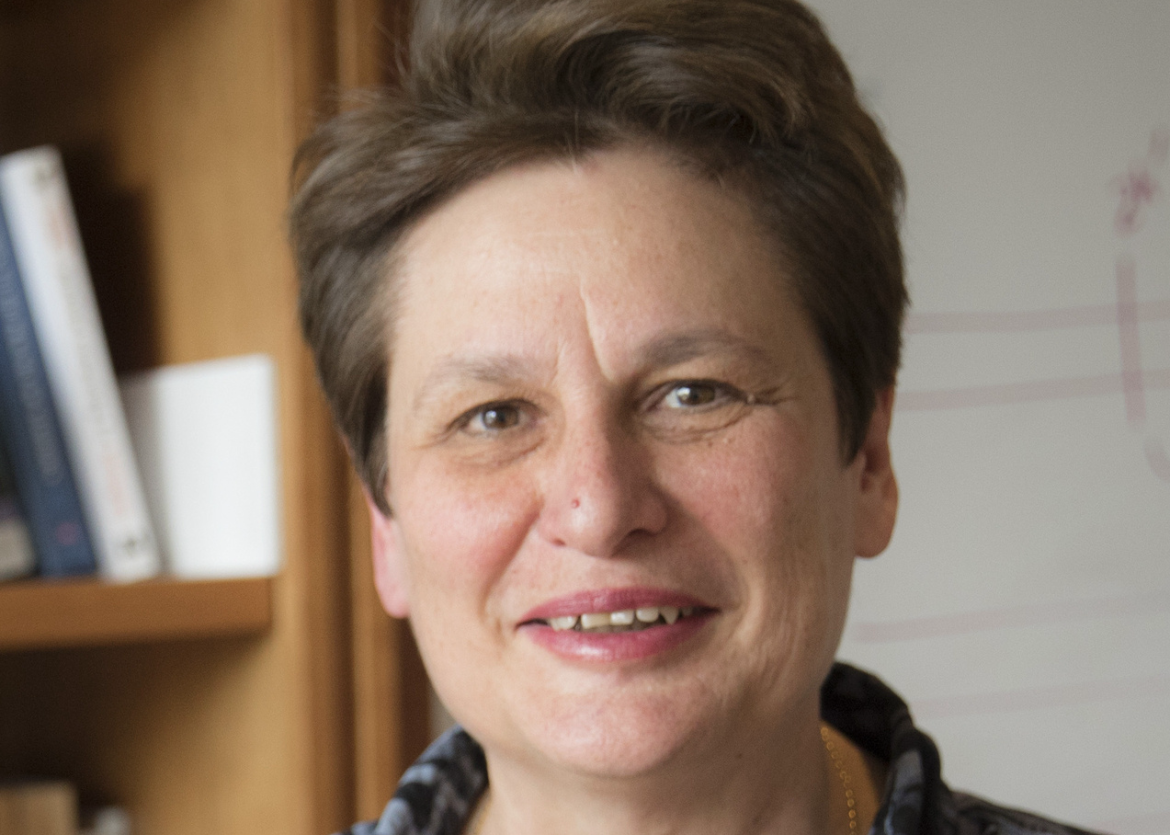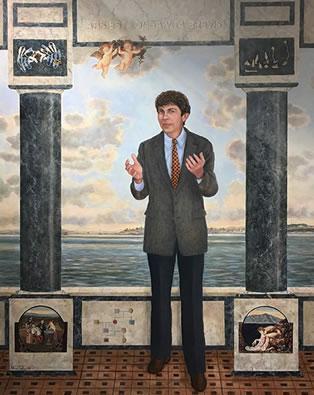
Harvard University molecular biologist and neuroscientist Catherine Dulac, PhD, will be featured as the visiting lecturer for the Sixth Samuel Barondes Lecture in Biological Psychiatry.
The UC San Francisco Department of Psychiatry and Behavioral Sciences is pleased to announce the return of its special distinguished visiting lectureship series highlighting the integration of biological sciences and psychiatry in honor of Jeanne and Sanford Robertson Endowed Chair and Department Chair Emeritus Samuel Barondes, MD.
The sixth Samuel Barondes Lecture in Biological Psychiatry will be held on Wednesday, January 8, 2025, beginning at 3:00 p.m. PST. This year's honored lecturer is Harvard University's Catherine Dulac, PhD, one of the world's leading figures in the exploration of the molecular and neuronal basis of instinctive social behaviors using molecular, genetic, and electrophysiological techniques. The title of her presentation will be "Molecular, Neural, and Developmental Architecture of Social and Sickness Behavior."
Social interactions are essential for animals to survive, reproduce, raise their young. Over the years, Dr. Dulac's lab has attempted to decipher the unique characteristics of social recognition: What are the unique cues that trigger distinct social behaviors, what is the nature and identity of social behavior circuits, how is the function of these circuits different in males and females and how are they modulated by the animal physiological status? In this lecture, she will describe their recent progress in understanding how specific brain circuits and cell types direct adaptive changes in behavior during sickness in mice and how neural populations controlling social and homeostatic behaviors emerge and mature during postnatal development, providing a new framework to understand the development of social and survival behavior circuits in health and disease.
This special lecture will be held at the UCSF Nancy Friend Pritzker Psychiatry Building in San Francisco. It is free and open to the public, although attendees should keep in mind that the talk will be geared towards a scientific and medical professional audience. Advance registration is required.
The presentation will also be streamed live via Zoom. Registration is required to receive Zoom connection details.
About Catherine Dulac, PhD
Catherine Dulac, PhD, is the Samuel W. Morris University Professor and a Howard Hughes Medical Institute Investigator in the Department of Molecular and Cellular Biology at Harvard University. Her work explores the molecular biology of pheromone detection and signaling in mammals, the neural mechanisms underlying age-, species-, and sex-specific behaviors, and the role of genomic imprinting in the developing and adult brain.
Dulac grew up in Montpellier, France. She graduated from the Ecole Normale Supérieure and in 1991 received her PhD from the University of Paris VI. She was a postdoctoral fellow at Columbia University and joined Harvard University as a junior faculty member in 1996 before becoming a professor of molecular and cellular biology in 2001. She also served as the chair of Harvard’s Department of Molecular and Cellular Biology from 2007 until 2013.
She is a biologist who has made crucial contributions to the molecular and functional identification of neural circuits underlying instinctive social behaviors in mice, and to the study of genomic imprinting in the adult and developing brain. Dulac and her team have helped decipher the unique characteristics of social recognition, including the sensory cues that trigger distinct social behaviors, the nature and identity of social behavior circuits in males and females, and how they are modulated by the animal physiological status. In recent work, her laboratory has uncovered how brain circuits control parenting behavior in both males and females, and how different parts of the brain participate in the positive and negative controls of parental care.
Dulac is a member of the National Academy of Sciences and a fellow of both the American Academy of Arts and Sciences and the American Association for the Advancement of Science. She is a member of the French Academy of Sciences and a Chevalier de la Légion d’Honneur.
She is also recipient of numerous awards, including the Richard Lounsbery Award, the Karl Spencer Lashley Award, and the Breakthrough Prize in Life Sciences. Dulac is a member of multiple scientific advisory boards in the United States and abroad, and recently served as the co-chair of the National Institutes of Health Advisory Committee to the NIH Director BRAIN Initiative Working Group 2.0.
About Samuel Barondes, MD

The official department portrait of Samuel Barondes, MD, the Jeanne and Sanford Robertson Endowed Chair and Chair Emeritus.
Samuel Barondes, MD, was educated at Columbia and Harvard and learned to do research at the National Institutes of Health as a postdoc with Gordon Tomkins and with Marshall Nirenberg, in whose laboratory he contributed to the Nobel Prize-winning studies that deciphered the genetic code.
Thereafter, Barondes devoted himself to integrating psychiatry with molecular biology and neuroscience. He has been a professor at the University of California since 1969, first at UC San Diego, where he was a founding member of the Department of Psychiatry and the Neuroscience Program and, since 1986 at UC San Francisco, where he initially served as chair of the Department of Psychiatry and director of the Langley Porter Psychiatric Institute. Since 1994, he has served as the Jeanne and Sanford Robertson Endowed Chair and Director of the Center for Neurobiology and Psychiatry. Throughout his time at UCSF, Barondes chaired the Chancellor’s Art Committee, overseeing the acquisition and commissioning of hundreds of works, with special emphasis on the J. Michael Bishop Collection at Mission Bay.
Barondes is a member of the National Academy of Medicine, and a fellow of the American Academy of Arts and Sciences and the American Association for the Advancement of Science. In 1976, he was a founder of the McKnight Neuroscience Program, and served as its president for 10 years. His books include Cellular Dynamics of the Neuron (1969); Neuronal Recognition (1976); Molecules and Mental Illness (1993); Mood Genes (1998); Better Than Prozac (2003); Making Sense of People (2011, 2016); and Before I Sleep: Poems For Children Who Think (2014).
Related links
About UCSF Psychiatry and Behavioral Sciences
The UCSF Department of Psychiatry and Behavioral Sciences and the Langley Porter Psychiatric Institute are among the nation's foremost resources in the fields of child, adolescent, adult, and geriatric mental health. Together they constitute one of the largest departments in the UCSF School of Medicine and the UCSF Weill Institute for Neurosciences, with a focus on providing unparalleled patient care, conducting impactful research, training the next generation of behavioral health leaders, and advancing diversity, health equity, and community across the field.
UCSF Psychiatry and Behavioral Sciences conducts its clinical, educational, and research efforts at a variety of locations in Northern California, including the UCSF Nancy Friend Pritzker Psychiatry Building; UCSF Langley Porter Psychiatric Hospital; UCSF Health medical centers and community hospitals across San Francisco; UCSF Benioff Children’s Hospitals in San Francisco and Oakland; Zuckerberg San Francisco General Hospital and Trauma Center; the San Francisco VA Health Care System; UCSF Fresno; and numerous community-based sites around the San Francisco Bay Area.
About the UCSF Weill Institute for Neurosciences
The UCSF Weill Institute for Neurosciences, established by the extraordinary generosity of Joan and Sanford I. "Sandy" Weill, brings together world-class researchers with top-ranked physicians to solve some of the most complex challenges in the human brain.
The UCSF Weill Institute leverages UCSF’s unrivaled bench-to-bedside excellence in the neurosciences. It unites three UCSF departments—Psychiatry and Behavioral Sciences, Neurology, and Neurological Surgery—that are highly esteemed for both patient care and research, as well as the Neuroscience Graduate Program, a cross-disciplinary alliance of nearly 100 UCSF faculty members from 15 basic-science departments, as well as the UCSF Institute for Neurodegenerative Diseases, a multidisciplinary research center focused on finding effective treatments for Alzheimer’s disease, frontotemporal dementia, Parkinson’s disease, and other neurodegenerative disorders.
About UCSF
The University of California, San Francisco (UCSF) is exclusively focused on the health sciences and is dedicated to promoting health worldwide through advanced biomedical research, graduate-level education in the life sciences and health professions, and excellence in patient care. UCSF Health, which serves as UCSF’s primary academic medical center, includes top-ranked specialty hospitals and other clinical programs, and has affiliations throughout the Bay Area.





